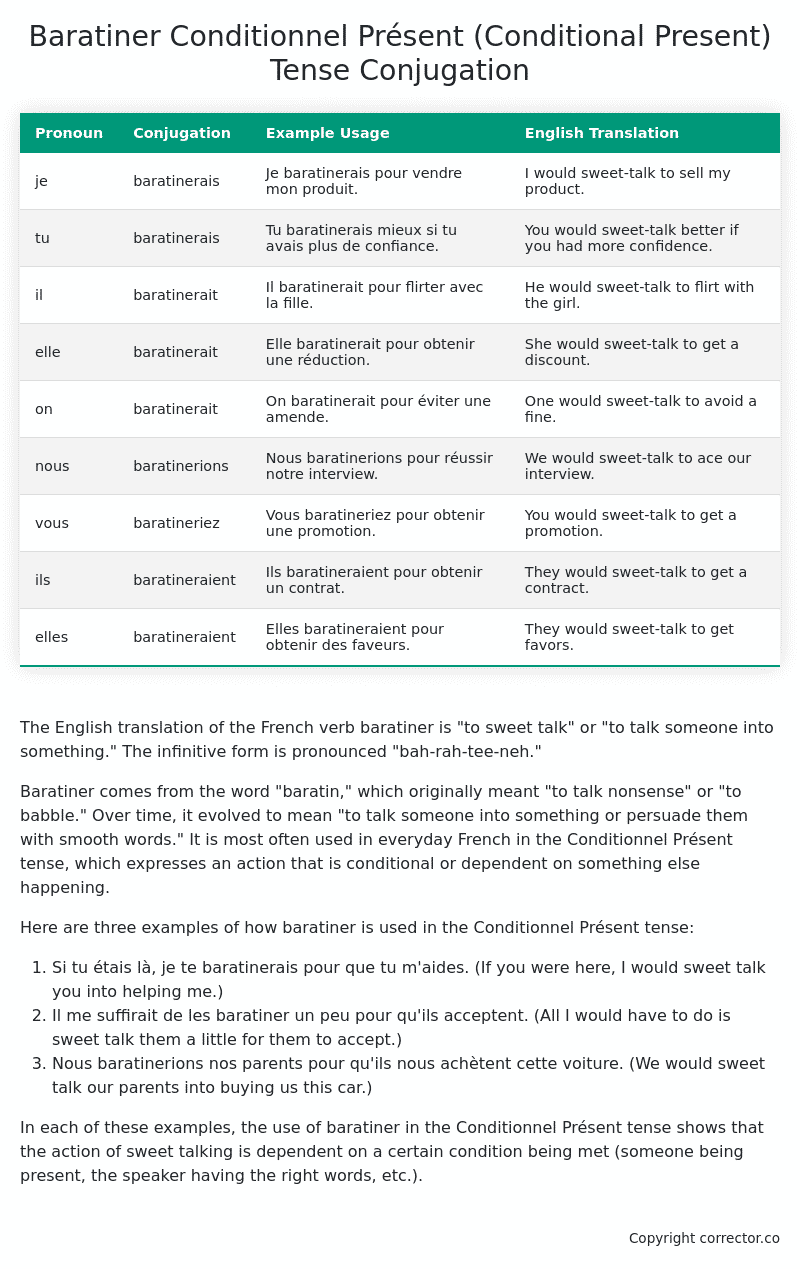Conditionnel Présent (Conditional Present) Tense Conjugation of the French Verb baratiner
Introduction to the verb baratiner
The English translation of the French verb baratiner is “to sweet talk” or “to talk someone into something.” The infinitive form is pronounced “bah-rah-tee-neh.”
Baratiner comes from the word “baratin,” which originally meant “to talk nonsense” or “to babble.” Over time, it evolved to mean “to talk someone into something or persuade them with smooth words.” It is most often used in everyday French in the Conditionnel Présent tense, which expresses an action that is conditional or dependent on something else happening.
Here are three examples of how baratiner is used in the Conditionnel Présent tense:
- Si tu étais là, je te baratinerais pour que tu m’aides. (If you were here, I would sweet talk you into helping me.)
- Il me suffirait de les baratiner un peu pour qu’ils acceptent. (All I would have to do is sweet talk them a little for them to accept.)
- Nous baratinerions nos parents pour qu’ils nous achètent cette voiture. (We would sweet talk our parents into buying us this car.)
In each of these examples, the use of baratiner in the Conditionnel Présent tense shows that the action of sweet talking is dependent on a certain condition being met (someone being present, the speaker having the right words, etc.).
Table of the Conditionnel Présent (Conditional Present) Tense Conjugation of baratiner
| Pronoun | Conjugation | Example Usage | English Translation |
|---|---|---|---|
| je | baratinerais | Je baratinerais pour vendre mon produit. | I would sweet-talk to sell my product. |
| tu | baratinerais | Tu baratinerais mieux si tu avais plus de confiance. | You would sweet-talk better if you had more confidence. |
| il | baratinerait | Il baratinerait pour flirter avec la fille. | He would sweet-talk to flirt with the girl. |
| elle | baratinerait | Elle baratinerait pour obtenir une réduction. | She would sweet-talk to get a discount. |
| on | baratinerait | On baratinerait pour éviter une amende. | One would sweet-talk to avoid a fine. |
| nous | baratinerions | Nous baratinerions pour réussir notre interview. | We would sweet-talk to ace our interview. |
| vous | baratineriez | Vous baratineriez pour obtenir une promotion. | You would sweet-talk to get a promotion. |
| ils | baratineraient | Ils baratineraient pour obtenir un contrat. | They would sweet-talk to get a contract. |
| elles | baratineraient | Elles baratineraient pour obtenir des faveurs. | They would sweet-talk to get favors. |
Other Conjugations for Baratiner.
Le Present (Present Tense) Conjugation of the French Verb baratiner
Imparfait (Imperfect) Tense Conjugation of the French Verb baratiner
Passé Simple (Simple Past) Tense Conjugation of the French Verb baratiner
Passé Composé (Present Perfect) Tense Conjugation of the French Verb baratiner
Futur Simple (Simple Future) Tense Conjugation of the French Verb baratiner
Futur Proche (Near Future) Tense Conjugation of the French Verb baratiner
Plus-que-parfait (Pluperfect) Tense Conjugation of the French Verb baratiner
Passé Antérieur (Past Anterior) Tense Conjugation of the French Verb baratiner
Futur Antérieur (Future Anterior) Tense Conjugation of the French Verb baratiner
Subjonctif Présent (Subjunctive Present) Tense Conjugation of the French Verb baratiner
Subjonctif Passé (Subjunctive Past) Tense Conjugation of the French Verb baratiner
Subjonctif Imparfait (Subjunctive Imperfect) Tense Conjugation of the French Verb baratiner
Subjonctif Plus-que-parfait (Subjunctive Pluperfect) Tense Conjugation of the French Verb baratiner
Conditionnel Présent (Conditional Present) Tense Conjugation of the French Verb baratiner (this article)
Conditionnel Passé (Conditional Past) Tense Conjugation of the French Verb baratiner
L’impératif Présent (Imperative Present) Tense Conjugation of the French Verb baratiner
L’infinitif Présent (Infinitive Present) Tense Conjugation of the French Verb baratiner
Struggling with French verbs or the language in general? Why not use our free French Grammar Checker – no registration required!
Get a FREE Download Study Sheet of this Conjugation 🔥
Simply right click the image below, click “save image” and get your free reference for the baratiner Conditionnel Présent tense conjugation!

Baratiner – About the French Conditionnel Présent (Conditional Present) Tense
Formation
Common Everyday Usage Patterns
Expressing Polite Requests
Expressing Hypothetical Situations
Expressing Doubt or Uncertainty
Interactions with Other Tenses
Present Tense
Past Tense
Future Tense
Conditional Perfect
Summary
Want More?
I hope you enjoyed this article on the verb baratiner. Still in a learning mood? Check out another TOTALLY random French verb conjugation!


